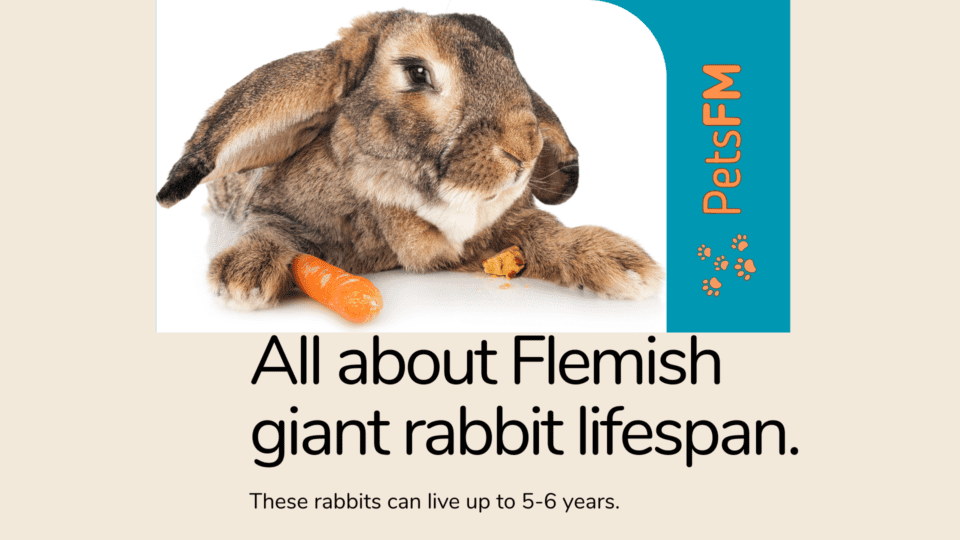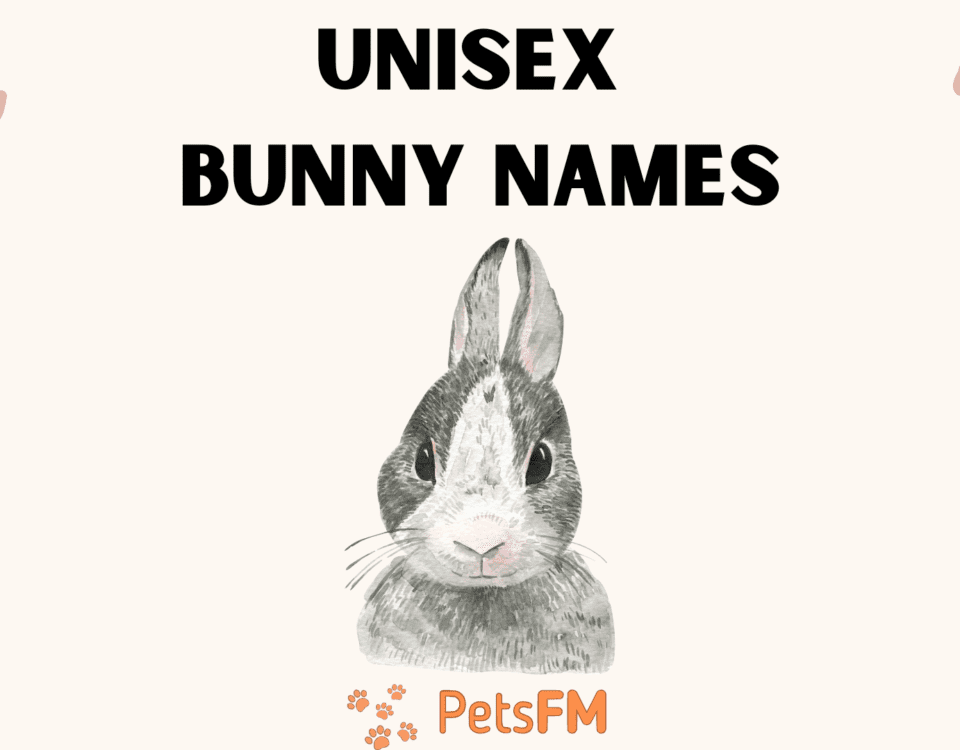Flemish Giant rabbits are some of the biggest bunnies you can find. They’re much larger than most other rabbit breeds, making them unique. Many people choose Flemish Giants as pets because they’re not just big but also very gentle and friendly. These rabbits are known for their calm and loving nature, which makes them great companions.
In this blog post, we’ll explore the average lifespan of these gentle giants and discuss various factors that can affect how long they enjoy a healthy life. Whether it’s their care, diet, or environment, a lot goes into ensuring these rabbits live a full and happy life.
What is the average lifespan of a Flemish Giant Rabbit?
Flemish Giant rabbits typically live for 5 to 8 years, but some can reach up to 10 years with excellent care. Flemish Giants have a shorter lifespan than smaller rabbit breeds, which can live 8-12 years. Their larger size contributes to a slightly reduced lifespan compared to smaller breeds, highlighting the importance of proper care to ensure they live a full, healthy life.
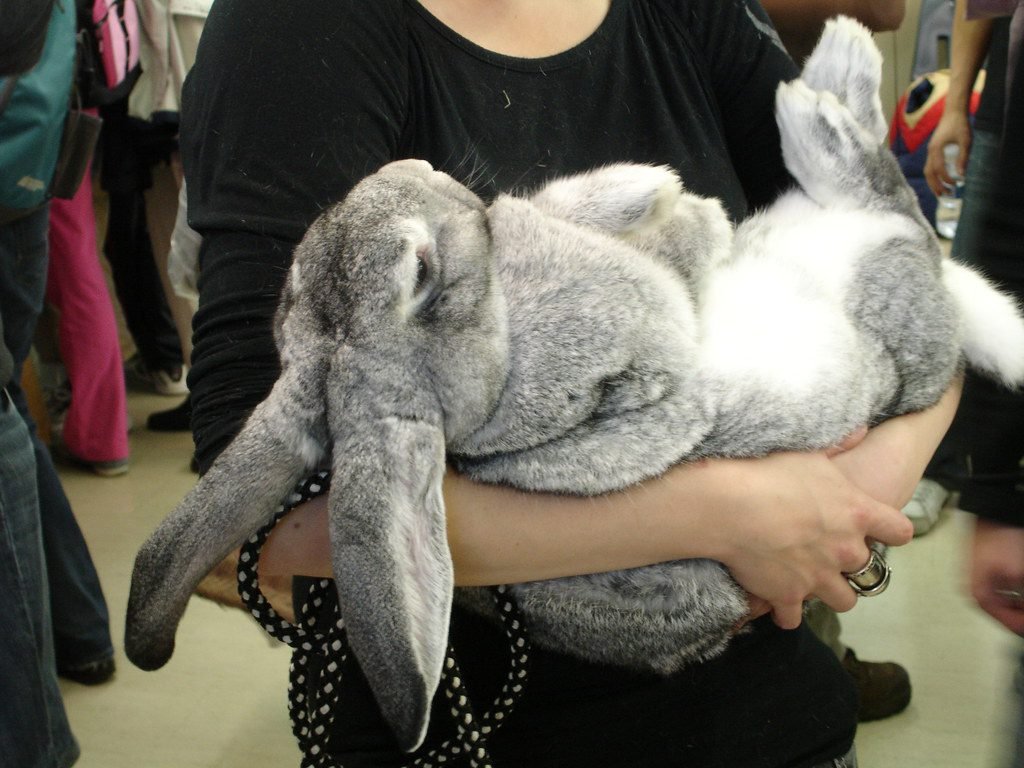
Colby The Flemish Giant Rabbit
Also, Read: Can Rabbits Eat Cabbage? Is It Safe to Eat?
Factors influencing the lifespan of a Flemish Giant Rabbit
Many things can change how long Flemish Giant rabbits live. Things like their genes, what they eat, where they live, how much they move, and seeing the vet can all make a big difference.
1: Genetics
The genetics of Flemish Giant rabbits play a crucial role in their overall health and longevity. Just like people, rabbits inherit traits from their parents, affecting how long and well they live.
Some genetic lines may be more prone to specific health issues, while others might naturally have stronger constitutions. Choosing rabbits from healthy, long-lived lines can improve the chances of a longer lifespan.
2: Diet
A balanced diet is essential for the health and longevity of Flemish Giant rabbits. These large rabbits need a fiber-rich diet to keep their digestive systems running smoothly.
High-quality hay should be the central part of their diet, supplemented with fresh vegetables, pellets, and plenty of clean water. Proper nutrition can prevent obesity and other health issues, leading to a healthier life.
3: Housing
Proper housing is another key factor affecting Flemish Giant rabbits’ lifespan. They need a spacious and secure environment to live in, whether it’s indoors or outdoors.
Their living space should protect them from extreme weather, predators, and harmful chemicals. Ample space allows for exercise and reduces stress, which is essential for their physical and mental health.
4: Exercise
Regular exercise is vital for Flemish Giant rabbits due to their large size. Exercise helps maintain a healthy weight, improves cardiovascular health, and keeps joints flexible.
Providing a safe area where they can hop, run, and play encourages physical activity and mental stimulation, both crucial for a long and healthy life.
5: Veterinary Care
Regular veterinary care, including annual check-ups, vaccinations, and dental care, is essential for identifying and preventing health issues early. Flemish Giant rabbits should be monitored for signs of illness, and health concerns should be addressed promptly.
Preventative care, such as spaying or neutering, can extend their lifespan by reducing the risk of certain cancers and other health problems.
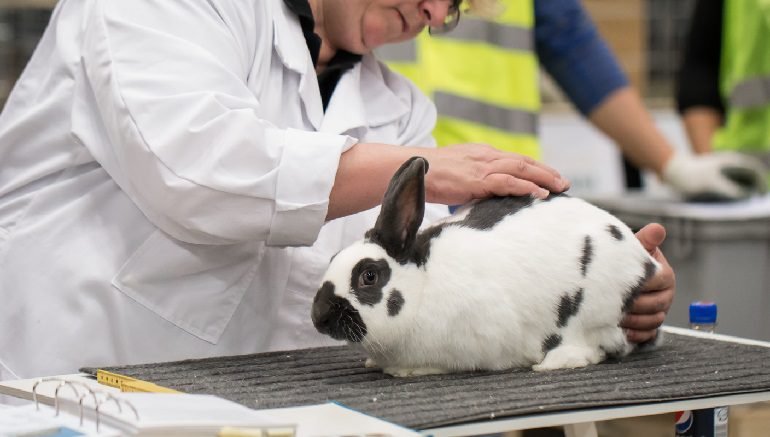
Rabbit at a Vet
Do flemish giant rabbits have any health concerns?
Flemish Giant rabbits, like all breeds, have specific health concerns that owners should be aware of. Recognizing and managing these issues early can lead to a healthier life for these large pets.
Gastrointestinal Stasis
This condition, where the digestive system slows down or stops, is dangerous for rabbits. A diet high in fiber is crucial to prevent it.
Dental Problems
Their teeth never stop growing. They can develop dental issues that affect eating and health without proper food to chew.
Skeletal Issues
Due to their large size, Flemish Giants can suffer from bone and joint problems, including arthritis. Proper nutrition and exercise are crucial to prevention.
Respiratory Infections
They can be prone to respiratory issues. Clean, well-ventilated living conditions help reduce the risk.
Heart Issues
Their size puts them at risk for heart problems. A healthy diet and regular exercise support heart health.
History and Origin of Flemish Giant Rabbits
Flemish Giant rabbits have a rich history that dates back to the 16th century in Belgium, where they were initially bred for their meat and fur. Over time, their gentle nature and impressive size gained popularity beyond these practical uses, turning them into beloved pets and show animals.
The breed was introduced to other countries and quickly became a favorite among rabbit enthusiasts worldwide.
Physical Characteristics
Flemish Giant rabbits are known for their remarkable size, with some weighing over 20 pounds! They have a powerful build, long ears, and a broad head.
Their fur comes in various colors: black, blue, fawn, light gray, sandy, steel gray, and white. Despite their large size, they have a very docile and gentle demeanor.
Temperament
These rabbits are often called “gentle giants” because of their calm and affectionate temperament. They are known to be very patient and tolerant, making them excellent pets for families.
Flemish Giants are intelligent and can be trained to do simple tasks like using a litter box. They enjoy interaction with humans and can form strong bonds with their owners.
Popularity as Pets
Flemish Giant rabbits are popular pets for several reasons. Their large size and unique appearance are eye-catching, but their personality truly wins people over. Despite their size, they are gentle, friendly, and easy to care for.
These qualities make them suitable for many homes, including those with children and other pets. Additionally, their calm nature and ability to bond with humans make them pets, companions, and family members.
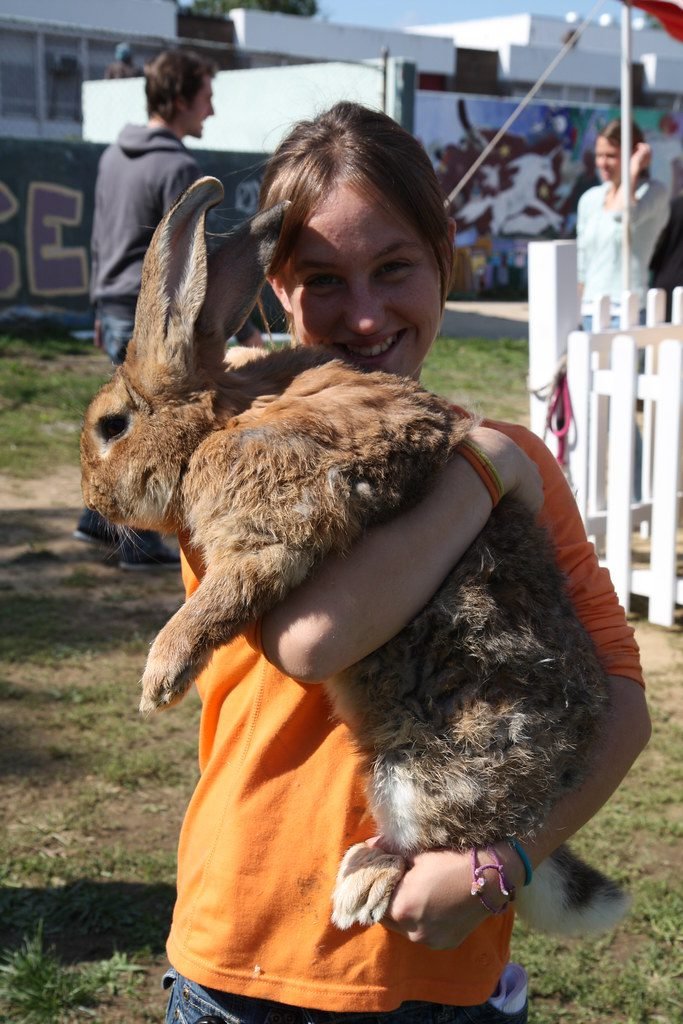
Giant Rabit, a Flemish
Maximizing your rabbit’s lifespan
To help your Flemish Giant rabbit live a long and healthy life, focus on their diet, exercise, health monitoring, and regular veterinary care. Each of these areas plays a vital role in their overall well-being.
Dietary Recommendations
- High-Quality Hay: This should be the central part of their diet to ensure proper digestion.
- Fresh Vegetables: Offer a variety of veggies daily for nutrients.
- Limited Pellets: Use high-fiber pellets but in moderation to prevent obesity.
- Clean Water: Always available and fresh.
Exercise and Enrichment
- Safe Space: Provide a large, safe area for them to hop, run, and explore.
- Toys: Offer toys for mental stimulation and to encourage physical activity.
- Interaction: Regular playtime and interaction with humans or other rabbits.
Health Monitoring
- Eating Habits: Changes can indicate health issues.
- Behavior Changes: Lethargy or aggression can signal discomfort or illness.
- Physical Checks: Regularly check for lumps, bumps, or changes in fur condition.
Veterinary Care
- Regular Check-Ups: Essential for early detection of health issues.
- Vaccinations: Keep up with necessary vaccinations and preventive treatments.
- Dental Care: Regular checks to prevent dental problems due to their continuously growing teeth.
Conclusion
Caring for Flemish Giant rabbits requires dedication and understanding of their unique needs. Proper diet, exercise, health monitoring, and veterinary care are crucial in extending their lifespan and ensuring their well-being. As gentle giants, they offer companionship and joy to those who commit to their care.
We encourage responsible pet ownership and thoughtful adoption, considering the special requirements of these large rabbits. By embracing these responsibilities, owners can provide a loving, healthy home for their Flemish Giants, ensuring they live full and happy lives.
Next Read: Unisex Bunny names (nature, character, mythology inspire, etc.)
